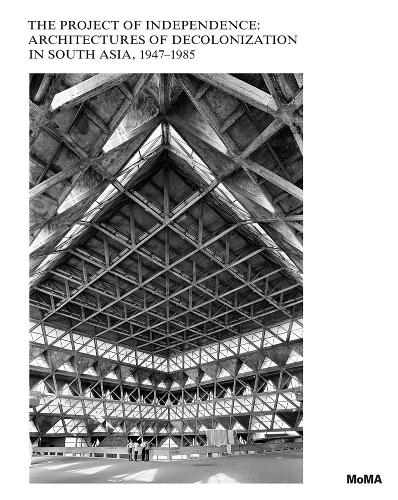
The Project of Independence: Architectures of Decolonization in South Asia, 19471985
(Hardback)
Publishing Details
The Project of Independence: Architectures of Decolonization in South Asia, 19471985
By (Author) Martino Stierli
Edited by Anoma Pieris
Edited by Sean Anderson
Contributions by Kazi Khaleed Ashraf
Contributions by Nonica Datta
Contributions by Prajna Desai
Contributions by Da Hyung Jeong
Contributions by Farhan Karim
Contributions by Evangelos Kotsioris
Contributions by Saloni Mathur
Museum of Modern Art
Museum of Modern Art
13th June 2022
24th February 2022
United States
Classifications
General
Non Fiction
History of architecture
Exhibition catalogues and specific collections
720.95409045
Physical Properties
Hardback
232
Width 240mm, Height 300mm
1660g
Description
How South Asian architects broke with the colonial past and found ingenious ways to negotiate modernism's universalist claims with the material and labor conditions on the ground
South Asia holds a unique place among the many regions of the world where modern architecture was understood as both a tool for social progress and a global lingua franca in the second half of the 20th century. Following the end of British rule in 1947-48, architects in the newly formed nations of India, Pakistan, Bangladesh (East Pakistan until 1971) and Ceylon (now Sri Lanka) proposed a novel understanding of modernity, disrupting the colonial hierarchy of center and periphery by challenging modernism's universalist claims.
Architecture offered multiple ways to break with the colonial past. Through the establishment of institutions that embodied the societal aspirations of the period, and the creation of new cities and spaces for political representation, South Asian architects produced a distinct body of work in dialogue with global developments while advancing the theory and practice of low-cost, climatically and socially responsive design.
Anchored by a newly commissioned portfolio of images from architectural photographer Randhir Singh, this richly illustrated and meticulously researched catalog features essays by the curators and leading scholars in the field on subjects such as the politics of concrete, institution-building, higher education, housing, infrastructure and industry, landscape and design, as well as presentations of 17 transformative projects from around the subcontinent. While several of the architects appearing in these pages have in recent years received monographic exhibitions, The Project of Independence marks the first attempt to consider their work within the ideological frameworks of its creation and the political context of the region as a whole.
Reviews
A rigorous revisionist deep-dive into a moment in history where Modernity promised more than it could ultimately deliver.--Suleman Anaya "PIN-UP"
Steeped in longing for a return to a more hopeful time when architects made nation-states. The drawings, models, and photographs on display reflect a willingness on the part of mid-century architects to collaborate with nation builders, no matter the cost.--Ateya Khorakiwala "The Architect's Newspapaer"
Explores how modern architecture in Bangladesh, India, Pakistan and Sri Lanka have given shape and manifestation to proclaiming autonomy, articulating national identities, and enacting social progress.--Cristina Kiran Piotti "Architectural Digest"
A new look at the modernist structures that defined Bangladesh, India, Pakistan and Sri Lanka after independence.... A major contribution.--Matt Shaw "Guardian"
A standard reference not only for architectural historians but also for future urban planners in societies undergoing transformation.--Jonathon Keats "Forbes: Media"
Filled with unsung triumphs and overlooked discoveries, the show is set to cast the architectural legacy of these South Asian countries in a renewed light.--Pei-Ru Keh "Wallpaper*"
Impresses the role architecture played in articulating and actualising what it meant to be politically sovereign after centuries of foreign imperial rule.--Cleo Roberts-Komireddi "Art Newspaper"
It's a sweeping, occasionally heartbreaking exhibition full of big ideas and beautiful work, too much of it not widely known.--Michael Kimmelman "New York Times: Arts"
Author Bio
Martino Stierli is The Philip Johnson Chief Curator of Architecture and Design at The Museum of Modern Art, New York. Sean Anderson, Associate Curator, The Museum of Modern Art, New York Kazi Khaleed Ashraf, Director-General, Bengal Institute Da Hyung Jeong Evangelos Kotsioris, Curatorial Assistant, The Museum of Modern Art, New York Nonica Datta Prajna Desai, C-MAP Fellow for Asia, The Museum of Modern Art, New York Farhan Karim, Assistant Professor of Architectural History, Architecture Department, School of Architecture & Design, The University of Kansas Saloni Mathur Rahul Mehrotra, Professor of Urban Design and Planning, Graduate School of Design, Harvard University Anoma Pieris, Associate Professor, Faculty of Architecture, Building and Planning, Melbourne School of Design, University of Melbourne Mrnalini Rajagopalan Peter Scriver, Associate Professor, and Amit Srivastava, Senior Lecturer, School of Architecture and Built Environment, University of Adelaide Devika Singh, Affiliated Scholar, Centre of South Asian Studies of the University of Cambridge; Member of Global Art Prospective, Institut National d'Histoire de l'Art (INHA), Paris Amit Srivastava
